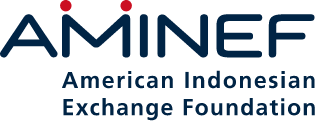Laura Anne Brubaker-Wittman received the Fulbright US Student Research Program to research orangutans in the wild during the habituation process affiliated with Universitas Nasional and the Gunung Palung Orangutan Conservation Project (GPOCP) in West Kalimantan.
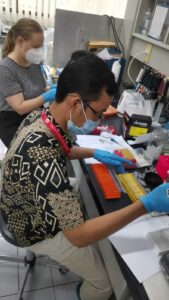
In mid-February, US Fulbright Student Research grantee Laura Brubaker-Wittman was invited to work with Dr. Taufiq Nugraha (BRIN – National Riset and Innovation Agency) and his collaborator, Dr. Gholib (University of Syiah Kuala) at the Wildlife Management and Reproduction Lab at the Research Center of Applied Zoology (Widyasatwaloka) at BRIN in Cibinong, Bogor. During the week of 13-17 Feb, she worked with Dr. Nugraha and Dr. Gholib, alongside several Indonesian BRIN researchers, to learn the process of how to perform an ELISA (Enzyme-Linked Immunosorbent Assay) analysis, which allows us to test for a variety of proteins found in extracted fecal samples from various animals in the wild and captivity.
As part of Laura’s Fulbright research, she will test for the presence of glucocorticoid metabolites in fecal samples taken from wild orangutans living in Gunung Palung National Park in West Kalimantan to measure how they experience stress in their interactions with researchers. For this analysis, she will bring the collected samples to the Zoology BRIN lab, so the visit was a great introduction to the lab, tools, and supplies she will use during that analysis.
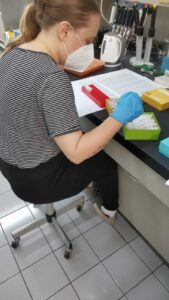
“I learned how to prepare a collection plate for dozens of samples and also how to use the machine that then reads the results from these plates, allowing us to measure and compare amounts of certain hormones in each sample. I was also taught how to analyze these results using computer software so that I now understand what they mean and how to recognize when something might have gone wrong with the sample preparation process. In addition, I was able to ask questions about my protocol for collecting orangutan fecal samples that I am currently undertaking at Cabang Panti Research Station,” Laura said.
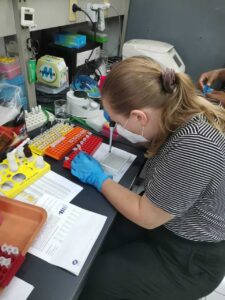
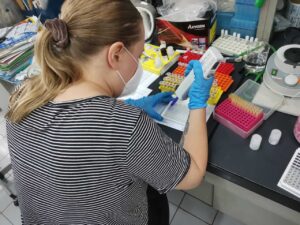
The said protocol was developed in collaboration with Dr. Nugraha based on his previous work with orangutan fecal samples from Kalimantan and Sumatra. As Laura is now collecting the samples, she finds the visit to BRIN’s research center extremely helpful to ask questions about certain aspects of the sample collection and storage process, as doing this in the field always brings its unique challenges. Laura, Dr. Nugraha, and Dr. Gholib were able to establish that the current fecal sample protocol is correct and should result in useful results once the sample collection is done and can be analyzed in the field. Laura also discussed with Dr. Nugraha and Dr. Gholib the specific reagents and other chemicals necessary for her analysis so that these can be purchased and prepared.
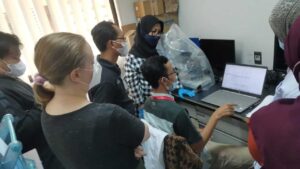
“Overall, I learned so much and gained confidence in my lab analysis and data analysis skills. I believe that this was the foundation of future collaborations with these incredible Indonesian scientists that will allow us to learn more about orangutans’ physiology and how this can help in the conservation of this endemic and important animals,” Laura concluded.
Last Updated: Mar 30, 2024 @ 9:18 pm
